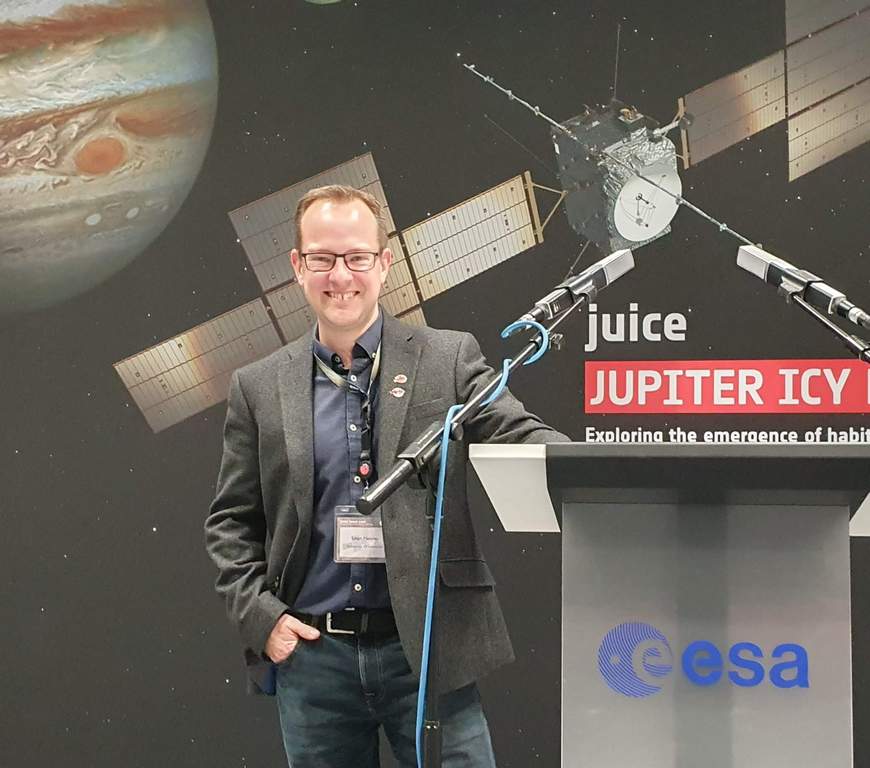On Wednesday 24th April, Prof Leigh N Fletcher will be joining us via Zoom to talk to us on “JWST: A New Voyager for the Outer Solar System”. We’ll dial in from the Herschel Museum of Astronomy at 7:30pm and visitors welcome (just drop us a note beforehand). Members have the option to also access the talk by Zoom.
The first two years of James Webb Space Telescope (JWST) scientific operations have produced a treasure trove of new discoveries, from the earliest galaxies and stars, to the myriad environments closer to home. Spectacular infrared images of all four giant planets have provided new views of their vigorous weather systems, wispy hazes, and ionospheric emissions, and revealed the delicate structures in their dusty and icy rings. But the key strength of JWST for Solar System studies are the integral field unit spectrometers, NIRSpec (0.6-5.3 µm) and MIRI (4.9-28.5 µm). These provide spatially-resolved infrared spectroscopy at high spectral resolution across their fields of view, enabling three-dimensional studies of temperatures, clouds, and composition within all four giant planet systems. Uranus and Neptune fit perfectly within JWST’s small fields-of-view, whereas complex mosaics are needed for Jupiter and Saturn. The JWST discoveries include maps of Jupiter’s Great Red Spot and South Polar aurora; observations of Io, Ganymede and the jovian rings; maps of Saturn’s northern summertime hemisphere; tracking of Titan’s seasonal storms; observations of Saturn’s crystalline rings; and global maps of Uranus and Neptune from the troposphere to the ionosphere. The latter represent one of the most significant new datasets for Ice Giant science since the days of Voyager-2, and it is hoped that these rich observations will be the start of a long-term programme monitoring the evolving appearance of the giant planets over the lifetime of JWST. This presentation will showcase some of the key giant-planet results from JWST, and how they connect to previous (Voyager, Cassini), current (Juno, Hubble), and future (JUICE, Clipper and Uranus Flagship) exploration.
About the speaker:
Prof. Leigh Fletcher is a Professor of Planetary Science at the University of Leicester, specialising in the exploration of our Solar System’s giant planets via robotic spacecraft missions, ground-based astronomical facilities, and space telescopes. He earned a Natural Science degree from Cambridge, a PhD in Planetary Physics from Oxford, and has since worked as a NASA fellow at the Jet Propulsion Laboratory and as a Research Fellow at Oxford. He held a Royal Society University Research Fellowship (URF) between 2013 and 2020. He was the recipient of the 2016 Harold C. Urey prize for outstanding achievements in planetary science by an early-career scientist, awarded by the Division for Planetary Sciences (DPS) of the American Astronomical Society. He is a team member for the Cassini mission to Saturn, the Juno and JUICE missions to Jupiter, and is a passionate advocate for future exploration of the distant Ice Giants. He currently leads a planetary atmospheres team at the University of Leicester, funded by the Royal Society, STFC, and the European Research Council. You can follow his research via Twitter and his blog on Substack, Planetary Wanderings.

